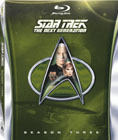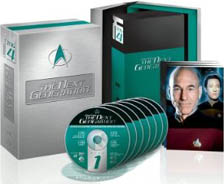The Best of Both Worlds
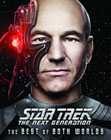
|
As much as I've always liked this story a lot, I've also always
instinctively wanted to resist the idea that this is the greatest
story of the entire run of Star Trek: The Next Generation.
Sure, it's an exciting drama, and a great mythology-advancing sci-fi
blockbuster, but it doesn't quite showcase any great philosophical
advances. Its events are quite violent, and a very ugly thing happens to
the series' lead character. Plus the final fix is a bit clumsy,
feeling like a tacked-on afterthought. Surely there must be a few
other episodes, equally dramatic and exiting, but a bit more
noble, polished, and clean...??
This has remained a difficult question to answer over the years,
but I think at least one thing is certain. "The Best of Both Worlds"
is definitely the best two-part story produced for "The Next Generation"
during its seven year run on television.
|
At the story's heart is a very human examination of ambition (or lack thereof),
particularly as it relates to career advancement. Several characters
become major players in this aspect of the drama, though Riker definitely
emerges as the big central protagonist of the entire two-part drama.
The stakes on the personal level are also nicely complemented by having
an impending big Borg battle as a backdrop - as the personal issues
reach the point of testing, it is the outcome against the Borg that will
deliver the verdict. The earliest scenes of the show hook the audience
well into this idea. This is the greatest challenge the Federation
has faced thus far, and it is uncertain whether or not they are ready.
One of the biggest coups for this story, particularly when it first aired,
was how believably well it created anticipation of changes to
the line-up of regular castmembers for the series. Key amongst the
ingredients is the extent to which guest star Elizabeth Dennehy's
character of Commander Shelby is fleshed out and made real. Significant time
is spent defining her, not only through what she says and does in her
extensive interactions with so many of our regulars, but also with the
many conversations others have about her in her absence. Not only that,
but we see immediately how much potential dramatic inter-personal conflict
could come with her, adding interest to any number of new stories.
All this makes it very, very easy to believe that a new regular character
is being introduced, and that this is just her debut story.
Might that mean that one of our other regulars would leave the show?
Such a notion was also quite believable, considering how Tasha Yar
only lasted for the first season, and how Dr. Crusher was replaced
for the second season and then brought back for the third, while Guinan,
O'Brien, and Pulaski became oft-recurring characters for season two.
Thus far, every season of TNG had made some alteration to the regular line-up.
What might be in store this time?
Early sections suggest Riker might be about to leave the show, promoted
to take command of another ship. It seems quite obvious, as Shelby
presumptuously declares her intention to replace him and take his
position. Was this his finale? He gets a lot of good
scenes wrestling with the idea - some of the most potent scenes in the
entire story in fact.
As the story escalates through several exciting action beats with the Borg,
a key turning point is reached as Captain Picard is captured.
In their previous outing, "Q Who", the Borg had merely featured
as an intractable force with the most bizarre social structure encountered
yet on Star Trek. But now here we see something new and significant -
they remake their captured enemies and add them to their own numbers.
In this respect, they truly imitated their sci-fi cousins,
the Cybermen on Doctor Who. In the mind of this sci-fi fan, as
probably with many other fans, the Borg would also, at least temporarily
until proven otherwise, inherit some of the precedents that the Cybermen
had set. In Doctor Who up to that point, if the Cybermen captured and
converted you, there was no hope for you anymore, no coming back.
Death was your only release.
I don't think we should underestimate this influence on
what the audience might expect from the rest of the story.
Indeed, once the away team discovers Picard and realizes what has been
done to him, it seems a foregone conclusion that this is the end for his
character. And suddenly, all the previous set-up for changing the regular
line-up seems to click into place. Of course! It's Patrick Stewart
who is leaving the show. Jonathan Frakes will stay, with his character
of Riker now promoted to be the Captain of the Enterprise,
while Shelby comes in as the new first officer. It all made perfect sense.
The fact that this story had a cliffhanger leading into a second episode
came as a complete surprise to me on first viewing - and it did get me
thinking that the tale was an even bigger deal than I had at first anticipated.
Cool! I could go for another helping, since the action and drama had been
good, and the Borg proved to be very worthy adversaries, ripe for
further exploration which no doubt would prove interesting. I got yet
another surprise when I tuned in the following week and got only a re-run
episode from the middle of the season. Huh? What the hell? What was going on?
I honestly don't know of any other TV show prior to this ending a season
on a mid-story cliffhanger. Sure, the practice went on to become
a staple on Star Trek and many other shows, sci-fi or otherwise, but did
"The Best of Both Worlds" set a precedent for this? It has always felt like
it did to me. Of course, Doctor Who was full of cliffhangers, but each of
its many seasons would finish one story off cleanly, and start the next
season with a fresh one. This new Trekkian/American concept of opening
a new season with "Part Two" of something has always felt quite clumsy
and less than ideal to me.
That said, once I figured out that I would have to wait several months
for Part Two at the beginning of the next season, the cliffhanger seemed
even more perfect in facilitating a cast change. Patrick Stewart didn't
even need to show up for season four. The big blast from the deflector
dish could be the opening shot of the season, and it could easily be
powerful enough to kill Stewart's character right off the bat, while the
rest of the Borg and their ship retaliate and challenge the Enterprise
crew for another episode.
And so, season four opened amidst high anticipation, and fans tuned back in
with baited breath. The deflector dish fired, but fizzled.
Locutus of Borg uttered fresh threats, unwavering and unfazed.
Okay, so they got Patrick Stewart to return for a guest spot
in this one episode. That was decent of him to oblige.
And the rest of the episode continued to fulfill expectations
with some satisfying dramatic turns. Riker got his promotion to
"the field rank of Captain", and began wearing four pips on his collar.
Shortly after, Riker makes his choice for new first officer, and Shelby
graduates from the 2.5 pips of a lieutenant commander to the 3 pips
of a full commander. With a little help from Guinan, Riker is able
to work through an issue to assume an effective style of command
that both achieves a modest tactical success against the Borg
and also wins Shelby's full respect and support while giving her something
critical to do.
Then the story begins doing the unexpected, setting itself apart from
some of the common patterns in Cybermen stories on Doctor Who. In fact,
it is only as a recaptured Picard is examined by Dr. Crusher and Data
that the title of this two-parter begins to make some sense. Both
Humans and Borg are exploring each other's cultures, learning from each other,
looking for tactical advantages among other things. Can the Humans
do it better, and pull the winning move out of this opportunity?
They are off to a great start. Against the ticking clock of the Borg cube's
flight through Earth's solar system, Data and the crew gradually peel
back the layers of Locutus's resistance and gain access to the Borg
collective. Picard also resists and meets them half-way, offering them
a vital clue. All good. This is about as close as the entire story comes
to championing an advanced philosophy: the philosophy of celebrating
Infinite Diversity in Infinite Combinations, and discovering
the Best of Both Worlds.
But right here the story slips a groove and stumbles a bit. The secret
command to win the day turns out to be.... "sleep"? That has to be
one of the most undramatic choices imaginable. Riker suggests Shelby
take an away team into the Borg cube to confirm how boring it all is,
which she does. That SHOULD be a move so dangerous that no one considers
it, and yet there it is, bland and boring as ever, with no real tactical
goal to the manoeuvre to keep us interested. Then for no sensible reason,
the Borg self-destruct mechanism kicks in,
and we suddenly make an exciting escape.
It was quite a satisfying moment to see that Borg cube finally get toasted,
after having seen it get away with so much nastiness in the middle of
season two, and again at the end of season three. But it also felt a bit
hollow, as we couldn't quite put our finger on how our characters had
achieved it. There just wasn't any logic in the journey from
going through "sleep" to "KABOOM!"
Also, as much as this has been a great Riker story most of the way through,
Riker doesn't really have any choices left to impact this story after
he masterminds and accomplishes the rescue of Picard. After that point,
the story's resolution rests with the rest of his crew. Thus, our main
protagonist seems a bit upstaged in the final moments.
One of the many things that blow my mind about the way that much
of "The Next Generation" was written was the degree to which things were
made up on the fly, using the "gardener" method of writing, as
opposed to a more methodical, pre-planned "architect" approach.
In particular, I'm not really sure how the season three finale
could have gotten its title unless the writer knew where he was headed
for his conclusion. But apparently, Michael Piller wrote part one
and had it shot, finished, and broadcast before actually sitting down
to figure out anything of part two... which blows my mind. Me,
I'd want both parts to be fully scripted before any shooting took place,
in part because I really put a lot of emphasis on endings that satisfy
and "prove the point" of a narrative. Strange that it seems to be standard
practice to ignore this where American season cliffhangers are concerned.
At any rate, the struggle Piller went through in wanting to leave the show
at the end of season three, and being convinced to do more for it
by Gene Roddenberry for season four, seems to have really helped shape
the character arc for Riker and his colleagues, and give it the immense
power that it has. In the end, this trade off for more gardening
and less architectural planning seems to have paid off.
|
Production-wise, this story chiefly builds on the great work that had
come before and maintains its high standard. All of the regular actors
are on their game, delivering compelling and pretty much flawless
performances. Whoopi Goldberg gets only one scene in each of the two
episodes, and knocks each one out of the park with memorable and
impactful advice. And Dennehy and George Murdock turn out to be
two of the very best guest stars ever to have graced the show.
It really is too bad though, that we never get to encounter
Dennehy's character again, to find out where she ended up,
or how her career path may have advanced. One can easily imagine her
becoming Captain or Admiral one day, and/or indeed perishing in the midst of
a dangerous mission somewhere. Whatever might have become of her?
This story is also a musical tour-de-force for composer Ron Jones,
perhaps unusually being allowed to get away with a more lively and
exciting score than normal due to the special nature of the story.
Personally, I think Jones delivered musical scores for several other stories
which turned out to be even better / more preferable than this one,
but "The Best of Both Worlds"
can likely still stand as the pinnacle of Star Trek TNG action music.
Some sections are a bit random for my tastes, but there are many, many
highlights throughout, and some great themes as well. Excellent!
|
|
The score for this story is available here:
|
|
Well, this is it, one of Star Trek's great adventures. Will it stand
as the Next Generation's greatest ever? Time will tell as we examine
the rest of what is on offer....
|
|



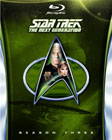

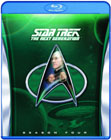


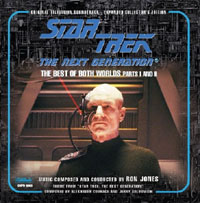



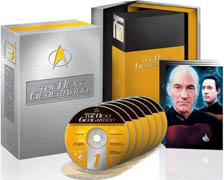


 (regular)
(regular)